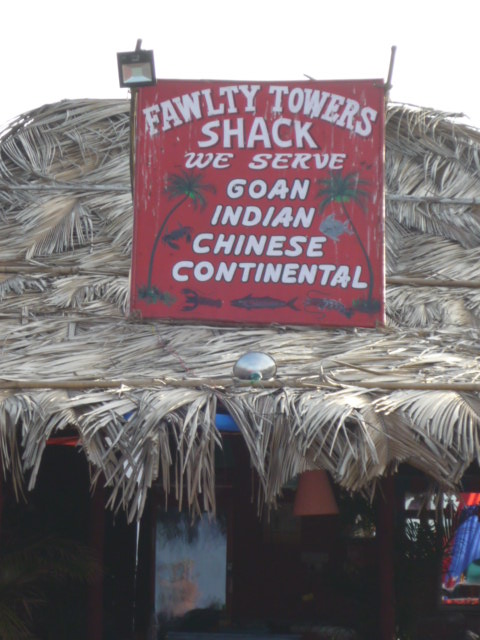 The immigration people letting you into Goa are pleasant and efficient, and by Indian standards, the bureaucracy is minimal. This made a welcome change from Qatar, where their intense dislike and distrust of Westerners was made abundantly clear. It almost felt, as one got into the queue at Doha airport, like they should put up two signs, ‘Residents’ and ‘Infidels’. I made a mental note not to attend their World Cup hosting in 2022.
The immigration people letting you into Goa are pleasant and efficient, and by Indian standards, the bureaucracy is minimal. This made a welcome change from Qatar, where their intense dislike and distrust of Westerners was made abundantly clear. It almost felt, as one got into the queue at Doha airport, like they should put up two signs, ‘Residents’ and ‘Infidels’. I made a mental note not to attend their World Cup hosting in 2022.
Perhaps they get the same feeling on arrival in the UK. But most of us were going to spend three hours wandering about the soulless airport before continuing the journey to somewhere else. It wasn’t as if we were going to demand welfare, use the money to make explosives and then bomb everyone to shit. It’s at times like that, however, that I look at my passport and wonder why everyone’s photo makes them look like a terrorist. It’s true, isn’t it? My Auntie Molly once said to me, “You’re a nice kid, but your passport shot suggests maybe you’re the Baader Meinhoff gang’s house rapist”.
But we were past all that: as I exited Goa’s main airport at 03.20, everyone was smiling. The other thing was that they all had a taxi. There’s an entirely different etiquette in Goa when it comes to taxis: in the West, the customers shout for the taxi. Here, they shout the word at you. “Taxi!” rang out the chorus every time people appeared bearing baggage. I’d been up for nearly twenty hours, so it took me aback. One of the most common questions you get asked in Goa is whether you want a taxi.
Somehow I managed to find the only taxi driver who had recently immigrated from Alpha Centauri’s 469-X/23Z planetary system. “Calangute please” I said. “Calangute Please,” he echoed unexpectedly, opening the rear door.
Indian driving is beyond eccentric; it’s seven stations up the line in a place called Nutjob. It makes the Eton Wall Game look sensible. It makes Roman drivers appear cautiously introverted by comparison. It is insane.
Officially, people drive on the left here, but that’s a mere detail thrown in to keep the bureaucrats happy. The white line in the middle of the road performs a similar function to that of the halfway line in football: once you cross it, things will start hurtling towards you. The idea is to weave through these things, prior to either returning to your own half or – quite often – turning right. At any given point in this automotive anarchy, there will very likely be more people driving on the right than the left. This is quite normal, and can be rendered less traumatic by closing your eyes.
The experience is made more hair-raising by thousands of scooters, the flashing of headlights, the hooting of horns, and random groups of cows strolling about as if they own the place.
Bovine roadsters politely using the slow lane
Which of course they do, because in India, cows are sacred. Doubtless the bankers think themselves above the law, but they come a very poor second to cows. There’s nothing a cow can’t do in India. She can shit anywhere, eat whatever she likes without paying, cross the road without warning and wander aimlessly down the middle of it without a stitch on. If a cow told the central bank to raise rates, it would be done without a moment’s hesitation. Thank God cows can’t talk. Or fly.
“Calangute please,” said the Alien. Not having seen a sign saying ‘Calangute’, I had my doubts. I showed him the Google maps page capture with the apartment complex clearly marked. He looked at the shot, then turned it upside down. This was less than encouraging.
“Calangute please,” ET repeated. It dawned on me that this might be a question rather than an assertion. One lone van appeared, approaching from in front. I opened the taxi door, and tried to look polite and normal as I waved the driver down. This is not Calangute, he confirmed…..go out of town and take the first right.
Ten minutes later, I was still trying every language I could summon up to explain to the cabbie what we had to do. Then I gave up and tried my Marcel Marceau technique. Then I gave up on that and gave him the apartment owner’s telephone number.
“Ah,” he said, a flicker of light in his eyes, “GPS number”.
“No,” I sighed, grabbing his phone and tapping the number out on his mobile.
Bear in mind this was 5.30 in the morning, but the owner Judith (who had been unfailingly helpful in putting my adventure together) answered almost immediately. The driver stiffened visibly as she spoke, and hastily rang off before driving on.
We drove up and down the main Calangute highway about eighteen times, before Judith’s concierge Babloo appeared to wrestle the cab to the ground.
In an unknown space within an unfamiliar place, the relief on finding that one’s destination isn’t just a delusion caused by Alzheimers is wonderful.
Desperate for dreams after 14 hours of air-conditioned braindeath, I realised once abed that I hadn’t packed a shotgun with which to kill a colony of scrawking ravens having a domestic in the communal gardens of the complex. I also realised within two hours that it is very quiet here once the ravens are dead…. but not during the local rush-hour, which starts at 7.30 am.






